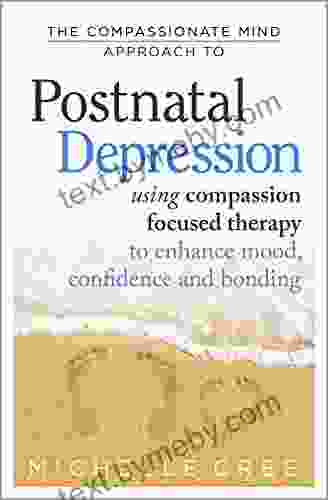The Compassionate Mind Approach to Postnatal Depression

Postnatal depression is a common and debilitating condition that affects many women after childbirth. It can cause a wide range of symptoms, including sadness, anxiety, fatigue, difficulty bonding with your baby, and even thoughts of self-harm. While postnatal depression is often seen as a purely hormonal issue, research is increasingly showing that it is also caused by psychological factors, such as negative self-talk and a lack of self-compassion.
4.7 out of 5
| Language | : | English |
| File size | : | 1378 KB |
| Text-to-Speech | : | Enabled |
| Screen Reader | : | Supported |
| Enhanced typesetting | : | Enabled |
| Word Wise | : | Enabled |
| Print length | : | 436 pages |
The Compassionate Mind Approach is a groundbreaking new approach to postnatal depression that combines the principles of mindfulness and compassion. This approach teaches women to cultivate self-compassion, reduce negative self-talk, and develop a more positive and supportive relationship with themselves. Research has shown that the Compassionate Mind Approach is effective in reducing symptoms of postnatal depression and improving women's overall well-being.
What is the Compassionate Mind Approach?
The Compassionate Mind Approach is a three-step process that involves:
- Cultivating self-compassion: This involves learning to treat yourself with the same kindness and understanding that you would show to a friend or loved one. It means accepting your flaws and imperfections, and speaking to yourself in a positive and supportive way.
- Reducing negative self-talk: This involves challenging and changing the negative thoughts that you have about yourself. It means identifying the triggers that lead to these thoughts, and developing more positive and realistic ways of thinking about yourself.
- Developing a more positive and supportive relationship with yourself: This involves developing a deeper understanding of your needs and values, and learning to take care of yourself both physically and emotionally. It means setting boundaries with others, and making time for activities that you enjoy.
How can the Compassionate Mind Approach help with postnatal depression?
The Compassionate Mind Approach can help with postnatal depression in a number of ways:
- It can help you to reduce negative self-talk: Negative self-talk is a major contributor to postnatal depression. The Compassionate Mind Approach teaches you how to challenge and change these negative thoughts, and develop more positive and realistic ways of thinking about yourself.
- It can help you to cultivate self-compassion: Self-compassion is the ability to treat yourself with the same kindness and understanding that you would show to a friend or loved one. The Compassionate Mind Approach teaches you how to develop self-compassion, and to accept your flaws and imperfections.
- It can help you to develop a more positive and supportive relationship with yourself: Postnatal depression can lead to feelings of isolation and loneliness. The Compassionate Mind Approach teaches you how to develop a more positive and supportive relationship with yourself, and to set boundaries with others.
Research on the Compassionate Mind Approach
Research has shown that the Compassionate Mind Approach is effective in reducing symptoms of postnatal depression and improving women's overall well-being. One study found that women who participated in a Compassionate Mind Approach program experienced a significant reduction in symptoms of postnatal depression, as well as improvements in their mood, self-esteem, and quality of life.
Another study found that the Compassionate Mind Approach was effective in preventing postnatal depression in women at risk of developing the condition. Women who participated in the program had a significantly lower risk of developing postnatal depression than women who did not participate in the program.
How to find a Compassionate Mind Approach therapist
If you are interested in trying the Compassionate Mind Approach, you can find a therapist who is trained in this approach by searching online or by asking your doctor or midwife for a referral. You can also find more information about the Compassionate Mind Approach on the website of the Compassionate Mind Foundation.
The Compassionate Mind Approach is a groundbreaking new approach to postnatal depression that can help women to reduce symptoms, improve their overall well-being, and prevent the condition from developing in the first place. If you are struggling with postnatal depression, I encourage you to consider trying the Compassionate Mind Approach. It could be the key to a happier and healthier future for you and your family.
Image: Woman holding a newborn baby
Alt text: A compassionate mother holding her newborn baby
4.7 out of 5
| Language | : | English |
| File size | : | 1378 KB |
| Text-to-Speech | : | Enabled |
| Screen Reader | : | Supported |
| Enhanced typesetting | : | Enabled |
| Word Wise | : | Enabled |
| Print length | : | 436 pages |
Do you want to contribute by writing guest posts on this blog?
Please contact us and send us a resume of previous articles that you have written.
 Book
Book Novel
Novel Page
Page Chapter
Chapter Text
Text Story
Story Genre
Genre Reader
Reader Library
Library Paperback
Paperback E-book
E-book Magazine
Magazine Newspaper
Newspaper Paragraph
Paragraph Sentence
Sentence Bookmark
Bookmark Shelf
Shelf Glossary
Glossary Bibliography
Bibliography Foreword
Foreword Preface
Preface Synopsis
Synopsis Annotation
Annotation Footnote
Footnote Manuscript
Manuscript Scroll
Scroll Codex
Codex Tome
Tome Bestseller
Bestseller Classics
Classics Library card
Library card Narrative
Narrative Biography
Biography Autobiography
Autobiography Memoir
Memoir Reference
Reference Encyclopedia
Encyclopedia Leslie Helm
Leslie Helm Rosemary Ferguson Robertson
Rosemary Ferguson Robertson Phong Thong Dang
Phong Thong Dang Penny Hastings
Penny Hastings Mark Millar
Mark Millar Louis Hyman
Louis Hyman Vincent Van Gogh
Vincent Van Gogh Lisa Jackson
Lisa Jackson Lola Glass
Lola Glass Morgan Lyle
Morgan Lyle Stefanie K Johnson
Stefanie K Johnson Michael Rice
Michael Rice Magnus Ekman
Magnus Ekman Marcia Desanctis
Marcia Desanctis Marie Force
Marie Force Marie Arana
Marie Arana Lynda Pflueger
Lynda Pflueger Margie Patlak
Margie Patlak Lynn Downey
Lynn Downey Michael Hyatt
Michael Hyatt
Light bulbAdvertise smarter! Our strategic ad space ensures maximum exposure. Reserve your spot today!

 Chris ColemanProfit Accumulation and Crisis in Capitalism: A Must-Read for Understanding...
Chris ColemanProfit Accumulation and Crisis in Capitalism: A Must-Read for Understanding...
 Avery SimmonsUnleashing the Magic of "Waking the Rainbow Dragon": A Captivating Adventure...
Avery SimmonsUnleashing the Magic of "Waking the Rainbow Dragon": A Captivating Adventure... Rodney ParkerFollow ·18.3k
Rodney ParkerFollow ·18.3k Mark TwainFollow ·11.4k
Mark TwainFollow ·11.4k George BellFollow ·2.2k
George BellFollow ·2.2k Curtis StewartFollow ·7.6k
Curtis StewartFollow ·7.6k Robert BrowningFollow ·16.1k
Robert BrowningFollow ·16.1k Billy PetersonFollow ·8.9k
Billy PetersonFollow ·8.9k Charlie ScottFollow ·11.3k
Charlie ScottFollow ·11.3k Troy SimmonsFollow ·2.3k
Troy SimmonsFollow ·2.3k

 Clay Powell
Clay Powell20 Must Visit Attractions In La Paz, Bolivia
La Paz, Bolivia...

 Giovanni Mitchell
Giovanni MitchellUltimate Guide to Special Forces Skills, Tactics, and...
The world of...

 Joseph Heller
Joseph HellerThe Texas Ranger and Hunter Illustrated: A Visual Journey...
Prepare to embark on an...

 José Martí
José MartíThe Secrets and Science of Ads That Sell More: A...
Are you struggling to create...

 Eli Blair
Eli BlairAdolescents and Their Families: A Comprehensive Guide for...
Adolescence,...

 Neil Gaiman
Neil GaimanMosby Diagnostic and Laboratory Test Reference: The...
In the dynamic healthcare landscape, staying...
4.7 out of 5
| Language | : | English |
| File size | : | 1378 KB |
| Text-to-Speech | : | Enabled |
| Screen Reader | : | Supported |
| Enhanced typesetting | : | Enabled |
| Word Wise | : | Enabled |
| Print length | : | 436 pages |








